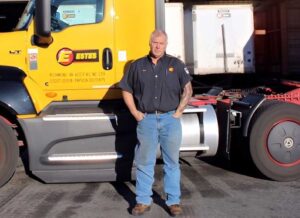A law signed by New York’s governor in September represents sweeping changes to the trucking industry in that state, leaving many in the industry to wonder how such a plan will work. Gov. Kathy Hochul signed the bill, which will ban the sale of new gas-powered cars and trucks in the state by 2035.
“New York is implementing the nation’s most aggressive plan to reduce the greenhouse gas emissions affecting our climate,” Hochul said in a statement. “To reach our ambitious goals, we must reduce emissions from the transportation sector, currently the largest source of the state’s climate pollution.”
The law redlines sales of gas-powered passenger cars, trucks, off-road vehicles, and equipment by 2035; medium- and heavy-duty vehicles will follow by 2045. Truck manufacturers will be required, starting with the 2025 model year, to meet an annual sales percentage of new zero-emission trucks, with that quota varying among vehicle classes.
By 2035, according to the new regulations, 55% of Class 2b-3 pickup trucks and vans, three-quarters of Class 4-8 trucks, and 40% of Class 7 and 8 tractors sold in the state must be zero-emission. The move models California’s recently passed Advanced Clean Trucks Rule and joins other states with similar guidelines, among them Massachusetts and New Jersey.
Members of trucking industry booed the new law on the grounds of its impracticality given the current electrical grid load, a lack of charging stations, and other real-world challenges.
“We have significant concerns, not the least of which is the lack of infrastructure,” noted Trucking Association of New York (TANY) President Kendra Hems. “We don’t think the state is going to be prepared to support the sales mandates. And it’s not only about the lack of infrastructure, but it’s also about the utilities having rate structures in place and what the overall cost of ownership is going to look like.”
Hems said the challenges of implementing the plan aren’t hard to find, and that they turn on some of the most obvious elements of traffic management.
“One of the big concerns we have as an industry is lack of truck parking, and now we’re talking about electrifying an industry where drivers already don’t have anywhere to park,” she said. “When we have electric trucks, where are they going to go to charge? That also gets into more of the cross-country challenges.”
To that point, a dozen governors last fall signed a letter to President Joe Biden urging him to pass federal legislation that would set similar deadlines and sales quotas. Until that happens, long-haul operators in states like New York are left wondering how to navigate a patchwork of regulations and infrastructure by state.
“If you leave California with a load of produce and you’re required to use an all-electric vehicle, is the infrastructure going to be there to get us across country? What does that look like?” said Ken Johnson, CEO of Farmington, New York-based Leonard’s Express and former chairman of TANY. “Some of these states that don’t share the same values as California and New York are not going to be motivated to move that quickly. Where are we going to be able to plug our trucks in?”
And then there’s the cost, which goes beyond just the price of equipping a fleet with new vehicles.
“The price of these zero-emission vehicles is currently quite a bit higher than a diesel truck,” said Johnson, whose company runs 650 rigs with 700 refrigerated trailers and 300 dry vans. “The other piece of it that you don’t hear a lot about in the publications is if the electrical grid is built big enough to handle all these additional chargers. If I have to put in 100 charging stations here in my terminal, is the electricity coming from the road adequate to handle that?”
Stephen Wadhams, president of Phelps, New York-based Wadhams Enterprises, said his company hadn’t even begun to think about going electric before the new law passed, in large part because of what he sees as inadequacies in the current technology.
“I personally just think this is a disaster; it’s pie in the sky as far as I’m concerned,” he said. “We’re already struggling to keep businesses in New York. This is just going to drive the cost up more. Trucking companies in this state are already struggling to stay here. We just keep raising our rates to our customers and customers just keep on leaving this state.
“(Lawmakers) just don’t get it. They just don’t get it. They sign these bills, and they have no clue on what it’s going to cost or what it’s going to take to even get there. It’s just ridiculous,” he said.
Hochul has already indicated she will seek reelection as governor of New York, a position she filled following Andrew Cuomo’s resignation in August in the face of multiple sexual harassment allegations. Trucking officials said they believe Hochul’s move was thus more about drumming up political points among environmental special interests than cleaning up greenhouse gases, leaving operators holding the bag.
“I don’t understand how they possibly think they can get this done,” said Greenville, New York-based Borwegen Trucking, Inc.’s President Terry Borwegen. “I know another company that has ordered electric trucks and he has them on order. He can’t get them. They’ve been on order for probably a year and a half now.”
Maine-based Brown Dog Carriers’ President and Co-Founder Graig Moran shared that he’s heard similar proposals being considered in his state. While he says he’s all for new technology, he cautions jumping the gun and creating regulations for technology that can’t yet be supported by the nation’s infrastructure.
“There’s a lot of work that would need to be done, I believe, before they could do a widespread sell on (zero-emission trucks),” he noted. “If we don’t have reliable technology, we’ll have downtime, we’ll equipment that doesn’t work. Where’s the infrastructure coming from that’s going to support these vehicles?
“You don’t want to be forced into buying something that’s going to be more expensive and that’s a lot less reliable than what we’ve got,” he continued. “Once it’s reliable, then hey, I’m all for giving it a shot. But I don’t think environmental groups should be pushing rules that will affect an (entire) industry.”
Dwain Hebda is a freelance journalist, author, editor and storyteller in Little Rock, Arkansas. In addition to The Trucker, his work appears in more than 35 publications across multiple states each year. Hebda’s writing has been awarded by the Society of Professional Journalists and a Finalist in Best Of Arkansas rankings by AY Magazine. He is president of Ya!Mule Wordsmiths, which provides editorial services to publications and companies.








